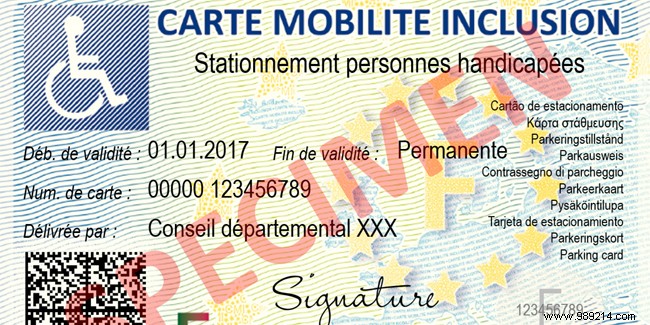
The mobility inclusion card (CMI) replaces since 1 st January 2017 the various disability, priority and parking cards, which allow people with disabilities and those with a loss of autonomy to benefit from certain rights, particularly in terms of transport. Many elderly people fall within the scope of use of the CMI, which is a free card issued by the departments. Who are the beneficiaries of the CMI? What is it for ? How to request it?
There are three types of mobility inclusion card (CMI) which each give the right to certain advantages in the field of transport in particular, but also when using certain services.
The CMI invalidity allows its holders to use seats in priority in public transport, in public spaces, such as waiting rooms for example, or even during events which welcome the public. This right of priority also applies to the person who helps you on your journeys.
This card also gives the right to benefit from specific provisions relating to the employment obligation of disabled workers, without having to take specific steps and in particular without having to be officially recognized as a disabled worker. These provisions allow a person with a loss of autonomy to obtain or keep their job. In the field of public transport, the CMI invalidity can also provide various commercial advantages, in particular for the RATP, the SNCF and Air France.
The CMI invalidity also gives advantages in tax matters. It thus allows its holders to benefit, subject to conditions, from an additional half-share for the calculation of income tax.
This card can, if necessary, mention that you need to be accompanied in your movements or, if your vision is less than 1/20 e normal, that you must also be helped by a third person. The CMI invalidity is also valid for the latter.
The priority CMI gives, like the disability CMI, priority access to seats in public transport and public spaces, as well as in queues.
As its name suggests, this type of CMI allows you to benefit from free parking without time limit for all public parking spaces. This right also applies to the person accompanying you in your vehicle.
Namely:the municipalities are free to limit the duration of the use of these parking spaces by holders of this CMI, without this duration being less than 12 hours. The parking CMI must be affixed in a visible location, attached to the windshield, in the vehicle, and removed when the beneficiary is not using his car.
It should be noted that the mobility inclusion card is granted for a period of between 1 and 20 years, except for the disability CMI which is valid permanently for people who have a permanent disability rate of at least 80% and whose activity limitations are not likely to evolve favorably over time.
The type of beneficiaries of the mobility inclusion card (CMI) varies according to the advantages to which it entitles.
The CMI invalidity concerns people who have a permanent disability rate of at least 80%, who are 3 e disabled. category, i.e. totally incapable of practicing a profession and obliged to have recourse to the assistance of a third person to carry out the essential acts of life, or the beneficiaries and applicants for the personalized autonomy allowance (Apa).
Priority CMI is assigned to people with a disability of less than 80% making standing difficult. As for the CMI parking, the beneficiaries must have a disability which considerably and permanently reduces their ability and their autonomy to move around on foot, who must be accompanied in their journeys, or people who touch or who are in the process of Apa request.
To be able to benefit from a CMI, you must apply for it at the Departmental House for People with Disabilities (MDPH) of his home (see contact details by department here).
The documents necessary for the constitution of the file are the following:
Some departments make it easier for the elderly to obtain the CMI by applying for it at the same time as the Apa.
Following the sending of the CMI request, a multidisciplinary team assesses the merits of its issuance and can therefore summon the person concerned. This assessment does not concern people who apply for the CMI invalidity holder of a 3 e invalidity pension category or Apa. If there is no response after 4 months, the CMI request is considered rejected.